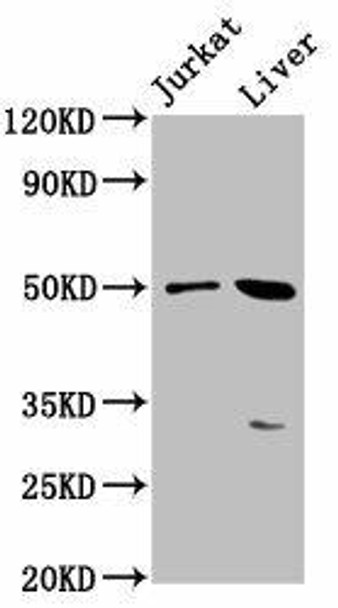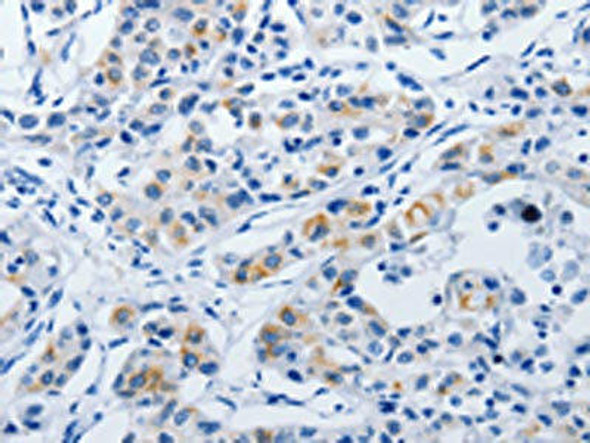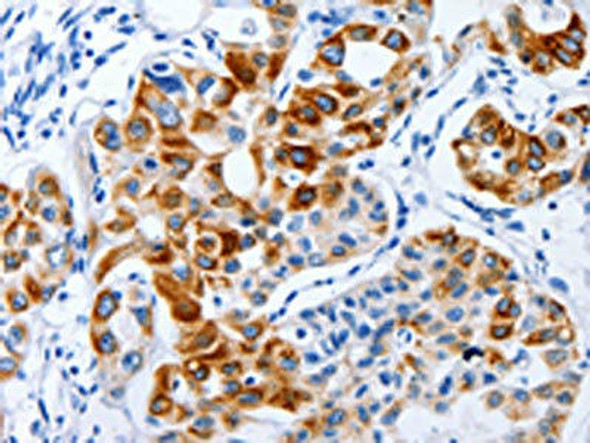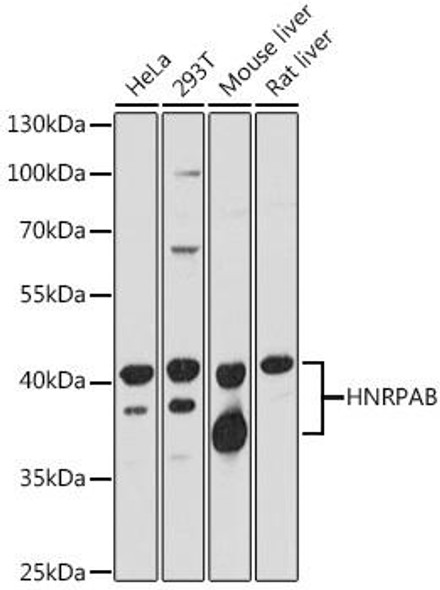BPIFB3 Antibody (PACO61286)
- SKU:
- PACO61286
- Product Type:
- Antibody
- Reactivity:
- Human
- Mouse
- Host Species:
- Rabbit
- Isotype:
- IgG
- Applications:
- ELISA
- WB
- Antibody Type:
- Polyclonal Antibody
- Conjugation:
- Unconjugated
Description
BPIFB3 Antibody (PACO61286)
The BPIFB3 Monoclonal Antibody (PAC061286) is a powerful tool for researchers exploring BPIFB3, a protein associated with innate immune defense in the respiratory tract. This antibody, developed using innovative technology, specifically targets BPIFB3 and is optimized for use in various immunological assays, including Western blotting and immunohistochemistry.BPIFB3, also known as Long palate, lung, and nasal epithelium carcinoma associated protein 3, plays a crucial role in maintaining lung health and protecting against respiratory infections.
Studies have shown that BPIFB3 levels are altered in conditions such as chronic obstructive pulmonary disease (COPD) and lung cancer, highlighting its potential as a biomarker for respiratory diseases. By utilizing the BPIFB3 Monoclonal Antibody, researchers can gain valuable insights into the functions and dysregulation of BPIFB3 in these pathologies, paving the way for novel therapeutic approaches and diagnostic strategies.
| Antibody Name: | BPIFB3 Antibody (PACO61286) |
| Antibody SKU: | PACO61286 |
| Size: | 50ug |
| Host Species: | Rabbit |
| Tested Applications: | ELISA, WB |
| Recommended Dilutions: | ELISA:1:2000-1:10000, WB:1:500-1:5000 |
| Species Reactivity: | Human, Mouse |
| Immunogen: | Recombinant Human BPI fold-containing family B member 3 protein (248-352AA) |
| Form: | Liquid |
| Storage Buffer: | Preservative: 0.03% Proclin 300 Constituents: 50% Glycerol, 0.01M PBS, pH 7.4 |
| Purification Method: | >95%, Protein G purified |
| Clonality: | Polyclonal |
| Isotype: | IgG |
| Conjugate: | Non-conjugated |
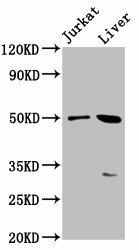 | Western Blot. Positive WB detected in: Jurkat whole cell lysate, Mouse liver tissue. All lanes: BPIFB3 antibody at 3.8µg/ml. Secondary. Goat polyclonal to rabbit IgG at 1/50000 dilution. Predicted band size: 51 kDa. Observed band size: 51 kDa. |
| Background: | May have the capacity to recognize and bind specific classes of odorants. May act as a carrier molecule, transporting odorants across the mucus layer to access receptor sites. May serve as a primary defense mechanism by recognizing and removing potentially harmful odorants or pathogenic microorganisms from the mucosa or clearing excess odorant from mucus to enable new odorant stimuli to be received (By similarity). |
| Synonyms: | BPI fold-containing family B member 3, Ligand-binding protein RYA3, Long palate, lung and nasal epithelium carcinoma-associated protein 3, BPIFB3, C20orf185, LPLUNC3 |
| UniProt Protein Function: | BPIFB3: May have the capacity to recognize and bind specific classes of odorants. May act as a carrier molecule, transporting odorants across the mucus layer to access receptor sites. May serve as a primary defense mechanism by recognizing and removing potentially harmful odorants or pathogenic microorganisms from the mucosa or clearing excess odorant from mucus to enable new odorant stimuli to be received. Belongs to the BPI/LBP/Plunc superfamily. BPI/LBP family. |
| UniProt Protein Details: | Protein type:Secreted, signal peptide; Secreted Chromosomal Location of Human Ortholog: 20q11.21 Cellular Component: cytoplasm; extracellular region Molecular Function:lipid binding Biological Process: innate immune response |
| UniProt Code: | P59826 |
| NCBI GenInfo Identifier: | 73620973 |
| NCBI Gene ID: | |
| NCBI Accession: | P59826.2 |
| Molecular Weight: | 50kDa |
| NCBI Full Name: | BPI fold-containing family B member 3 |
| UniProt Protein Name: | BPI fold-containing family B member 3 |
| UniProt Synonym Protein Names: | Ligand-binding protein RYA3; Long palate, lung and nasal epithelium carcinoma-associated protein 3 |
| Protein Family: | BPI fold-containing family |
| UniProt Gene Name: | BPIFB3 |
| UniProt Entry Name: | BPIB3_HUMAN |

